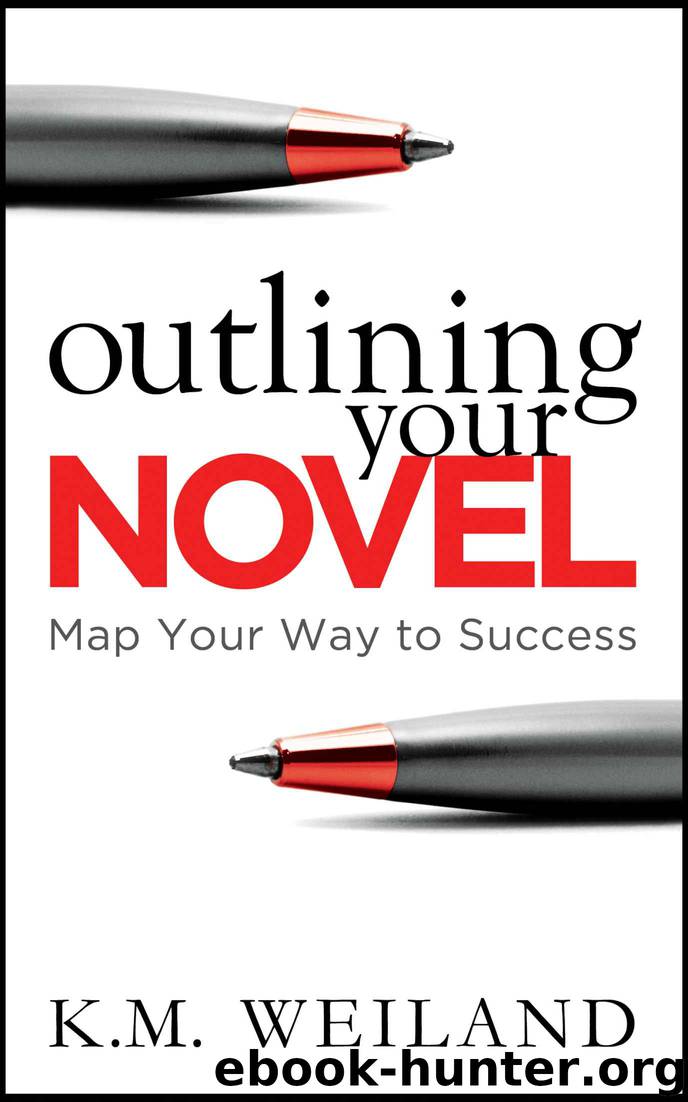Outlining Your Novel: Map Your Way to Success by Weiland K.M

Author:Weiland, K.M. [Weiland, K.M.]
Language: eng
Format: epub
Tags: gifts for writers, outlining, writer, outline, novels, Writing Skills, author, story, fiction, how to write, book, k.m. weiland, writing, novel writing, books, writing guide
Publisher: PenForASword Publishing
Published: 2013-11-29T00:00:00+00:00
How to Discover Your Theme
How do you go about implementing theme? Or perhaps the better question is: Should you go about implementing theme? Many writers avoid deliberate thoughts of theme while constructing their outlines and writing their first drafts. Many enter their stories with little or no intention for a specific theme, until, somewhere in the middle of the novel, the characters do or say something that dangles the scarlet thread of theme in front of the delighted author’s nose.
Although I have never gone so far as to ignore theme (from the moment of a story’s conception, I have my eyes stretched wide to catch that first glimpse of a possible theme), I do believe the single most important trick for capturing the sometimes elusive and always ephemeral theme is to pour yourself into creating authentic characters who react to their various crucibles in authentic ways.
Thanks to your outline, you know where the story will end before you ever write your first draft. Because you’ll be able to see your plot progression and character arcs at a glance, you’ll be able to identify your theme early on. Most stories offer a variety of themes, but you’ll want to ask yourself the following questions in order to discover and strengthen the most prominent thematic thread:
• What’s the main character’s internal conflict? In most novels, this is a question that gets answered early in the outlining process, since it will drive the entirety of the story.
• Which of the main character’s views will change as a result of the story’s events? How and why? This is where you’ll find the underlying force of your theme. Your character’s views will define his actions, and his actions will define the story.
• How will the main character demonstrate his respective views and attitudes at the beginning and the end of the story? This is an extension of the previous question, but it is vital because, as we discussed earlier in regard to character arc, its answer will prove the changes to the reader.
• Is there any particular symbolism that can reinforce the theme and the character’s attitude toward it? Like theme itself, symbolism is often overstated and generally better when culled organically from your unconscious mind. For example, sometimes you’ll find yourself using a particular color or image to represent something. If the symbol proves effective, you can later go back and strengthen it. (Refer to the section “How to Strengthen Your Theme With Symbolism” on the following page.)
• How can you use the subtext (the unstated) to exemplify the theme, so you won’t have to spell it out for the reader? When it comes to theme, the unstated is almost always more powerful than the direct. In real life, when we find ourselves learning lessons and changing views, we can’t always immediately define the changes in precise language. And neither should your character. Lord Jim didn’t have to tell us his actions on the island were a direct result of his earlier cowardice; the
Download
This site does not store any files on its server. We only index and link to content provided by other sites. Please contact the content providers to delete copyright contents if any and email us, we'll remove relevant links or contents immediately.
Asking the Right Questions: A Guide to Critical Thinking by M. Neil Browne & Stuart M. Keeley(5765)
Autoboyography by Christina Lauren(5229)
Eat That Frog! by Brian Tracy(4528)
Dialogue by Robert McKee(4392)
Sticky Fingers by Joe Hagan(4191)
Journeys Out of the Body by Robert Monroe(3621)
Annapurna by Maurice Herzog(3465)
Full Circle by Michael Palin(3444)
Schaum's Quick Guide to Writing Great Short Stories by Margaret Lucke(3376)
Elements of Style 2017 by Richard De A'Morelli(3343)
The Art of Dramatic Writing: Its Basis in the Creative Interpretation of Human Motives by Egri Lajos(3063)
Atlas Obscura by Joshua Foer(2956)
Why I Write by George Orwell(2946)
The Fight by Norman Mailer(2931)
The Diviners by Libba Bray(2930)
In Patagonia by Bruce Chatwin(2923)
The Mental Game of Writing: How to Overcome Obstacles, Stay Creative and Productive, and Free Your Mind for Success by James Scott Bell(2906)
Venice by Jan Morris(2571)
The Elements of Style by William Strunk and E. B. White(2470)
